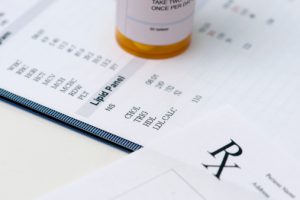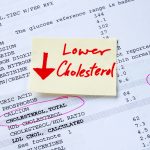 Cholesterol is on everybody’s mind, but there are many misconceptions around it. To start, there are two types of cholesterol – good and bad. Bad cholesterol, or low-density lipoprotein (LDL), creates plaque buildup along the artery walls which can contribute to cardiovascular problems. Good cholesterol, or high-density lipoprotein (HDL), carries away LDL to keep our arteries healthy. It is also important to know that our livers naturally produce cholesterol, and we consume it in our food.
Cholesterol is on everybody’s mind, but there are many misconceptions around it. To start, there are two types of cholesterol – good and bad. Bad cholesterol, or low-density lipoprotein (LDL), creates plaque buildup along the artery walls which can contribute to cardiovascular problems. Good cholesterol, or high-density lipoprotein (HDL), carries away LDL to keep our arteries healthy. It is also important to know that our livers naturally produce cholesterol, and we consume it in our food.
The Centers for Disease Control and Prevention (CDC) estimates 31.7 percent of the U.S. population has bad cholesterol. This is dangerous because it can contribute to heart disease as plaque builds-up along the arteries and reduces blood flow. Worse yet, the CDC reports that fewer than one in three American adults have their LDL cholesterol under control.
Advertisement
Lifestyle habits can play a large role in maintaining healthy cholesterol, but if your levels are very unhealthy, a doctor may prescribe medications in order to reduce the high LDL. Statins, bile acid binding resins, cholesterol absorption inhibitors, fibrates, niacin or combinations of medications may be recommended as a means to reduce bad cholesterol. Recently, two new cholesterol-lowering medications were approved and have hit the market; unfortunately, you may never receive the benefits from them.
High-cost of cholesterol-lowering medicines make them unattainable
 A recent report outlined that two new cholesterol-lowering medications are simply too costly for the majority of individuals who require them to ever experience the benefits. The report comes from a U.S. non-profit organization which examines drug cost effectiveness.
A recent report outlined that two new cholesterol-lowering medications are simply too costly for the majority of individuals who require them to ever experience the benefits. The report comes from a U.S. non-profit organization which examines drug cost effectiveness.
Both medications work to reduce LDL cholesterol and were approved by the FDA earlier this year. In the FDA report they claimed the medications could reduce LDL cholesterol by 55 to 60 percent in patients taking statins and for those who cannot take statins.
The recent report suggests both medications are highly beneficial; unfortunately, their cost is simply too high. A representative from the Institute for Clinical and Economic Review (ICER) said, “With a list price over US$14,000 per year there are serious questions regarding the price at which these drugs would represent a sensible value to patients and to the health care system.” Researchers suggest a price drop of 67 percent could improve overall benefits for patients.
Advertisement
President of ICER, Steven Pearson, added, “If the cost is more than $2,177 a year, drug companies, doctors, insurers and other parties may need to work together to determine ways to limit the use of these drugs, find savings in other parts of the health care system, or adopt other measures to help make these drugs more affordable.”
How to naturally and cost-effectively lower cholesterol
 Medications can be expensive, especially when a person is on a fixed income or does not have insurance. For these reasons, it’s important to stick to easy lifestyle habits, which are not only natural but cost-effective as well. Below are some tips to implement into your daily life to reduce your cholesterol.
Medications can be expensive, especially when a person is on a fixed income or does not have insurance. For these reasons, it’s important to stick to easy lifestyle habits, which are not only natural but cost-effective as well. Below are some tips to implement into your daily life to reduce your cholesterol.
- Diet – because much of our cholesterol can come from the foods we eat, it’s important to enjoy a healthy diet. Some notable foods which help lower cholesterol are: foods high in fiber, fish, nuts, avocados and olive oil.
- Exercise – regular exercise can help boost HDL cholesterol, and you can also see benefits in your blood pressure.
- Lose weight to benefit overall health.
- Limit saturated fats and completely avoid trans fats.
- Don’t smoke or quit smoking.
- Get checked out – because our bodies naturally produce cholesterol, ensure you are getting checked by a doctor and know your levels.
Lifestyle changes are a great way to lower your cholesterol naturally and improve your overall health. If you’re concerned about your cholesterol, go speak with your doctor, and remember not to stop or change medications without medical guidance.
